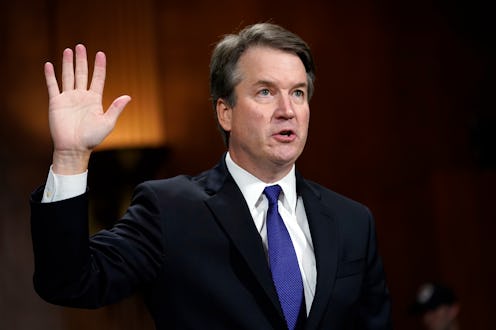
On Saturday, following weeks of controversy, Brett Kavanaugh was confirmed to the Supreme Court. With a 50-48 vote, senators approved his nomination, making him the second justice President Donald Trump has successfully appointed to the court.
The vote fell along party lines, save for Democratic Sen. Joe Manchin of West Virginia, who voted "aye" on Kavanaugh, and Republican Sen. Lisa Murkowski, who voted "present." Although she voted against Kavanaugh during the Senate cloture vote Friday, Murkowski chose to vote "present" on Saturday in Republican Sen. Steve Daines' absence. (He flew back to Montana to attend his daughter's wedding on Saturday.)
It's an arrangement known as "pairing." Senate Majority Leader Mitch McConnell's spokesperson explained, “When a senator is necessarily absent (for example, attending their daughter’s wedding), they can ‘pair’ with another senator who is voting the opposite way."
Initially, Kavanaugh's nomination was controversial in the way that most Supreme Court nominations are: the minority party — in this case, Democrats — was opposed to the person put forth by the majority party. But in September, disagreement over Kavanaugh's nomination was heightened when three women separately accused Kavanaugh of sexual misconduct. Kavanaugh vehemently denies each accusation.
First, Christine Blasey Ford alleged that Kavanaugh sexually assaulted her while they were both teenagers in high school. According to the California professor, she was 15 at the time and Kavanaugh was 17. In response to the allegation, Kavanaugh said in a statement, "This is a completely false allegation. I have never done anything like what the accuser describes — to her or to anyone."
Ford ultimately testified about her allegation before the Senate Judiciary Committee, as did Kavanaugh. However, senators largely remained divided along party lines, even after hours of testimony.
Later, Deborah Ramirez alleged Kavanaugh exposed himself to her while the two were playing a group drinking game as students at Yale University. She claimed that she was forced to touch Kavanaugh's penis as she pushed him away. Speaking before the Senate Judiciary Committee last Thursday, Kavanaugh said, "I’ve never sexually assaulted anyone. Not in high school, not in college, not ever. Sexual assault is horrific."
The third woman to make an allegation against Kavanaugh was Julie Swetnick, who said in a "sworn declaration" that she saw him at parties in the 1980s where, she claimed, he wasn't "taking 'no' for an answer." In her statement, Swetnick said that Kavanaugh and his friend would try making girls "inebriated and disoriented so they could then be 'gang raped'" by a "'train' of numerous boys." Swetnick further alleged that she was "incapacitated without my consent and unable to fight off the boys." Kavanaugh denied these allegations, saying in a statement that "this is ridiculous and from the Twilight Zone. I don’t know who this is and this never happened."
Regardless of how the confirmation vote ultimately turned out, the way the Senate chose to handle the allegations will go down in history. The confirmation process, above all, renewed a vital conversation about the obstacles so many survivors face in coming forward with their stories.
If you or someone you know has been sexually assaulted, call the National Sexual Assault Telephone Hotline at 800-656-HOPE (4673) or visit online.rainn.org.
Read More About Brett Kavanaugh's Confirmation
The Reason Supreme Court Justices Serve For Life Is Right In The Constitution
This Is How Your Senator Voted On Brett Kavanaugh
SCOTUS Justices Can Be Impeached, But That Doesn't Mean It'll Happen To Kavanaugh
Opinion: "Believe Women” Means Nothing If You’re Not Doing Anything About It